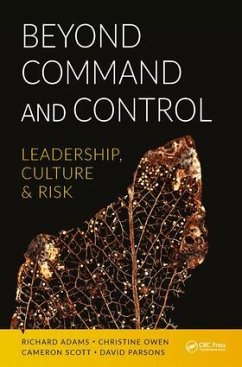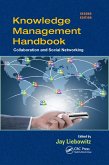Richard Adams, Christine Owen, Cameron Scott, David Phillip Parsons
Beyond Command and Control
Leadership, Culture and Risk
Richard Adams, Christine Owen, Cameron Scott, David Phillip Parsons
Beyond Command and Control
Leadership, Culture and Risk
- Broschiertes Buch
- Merkliste
- Auf die Merkliste
- Bewerten Bewerten
- Teilen
- Produkt teilen
- Produkterinnerung
- Produkterinnerung
This book will advance the understanding of leadership beyond the inherited myths and modalities of command and control. Leadership is separated from ideas and institutional seniority and explained as the collaborative power of one with others. Enabling the intelligent co-participation of all people, the constructive effect of this approach to leadership is in the engagement of people. This is significant when task accomplishment depends not on managerial direction, but on the interaction of people with each other, with technical systems, and with complex regulations which are often across…mehr
Andere Kunden interessierten sich auch für
![Aging and Work Aging and Work]() Aging and Work78,99 €
Aging and Work78,99 €![Eliminating Serious Injury and Death from Road Transport Eliminating Serious Injury and Death from Road Transport]() Ian Ronald JohnstonEliminating Serious Injury and Death from Road Transport78,99 €
Ian Ronald JohnstonEliminating Serious Injury and Death from Road Transport78,99 €![Work and Aging Work and Aging]() Jan Snel (ed.)Work and Aging100,99 €
Jan Snel (ed.)Work and Aging100,99 €![Management and Sustainability in the Belt and Road Management and Sustainability in the Belt and Road]() Management and Sustainability in the Belt and Road85,99 €
Management and Sustainability in the Belt and Road85,99 €![Command and Control in Military Crisis Command and Control in Military Crisis]() Harald HoibackCommand and Control in Military Crisis73,99 €
Harald HoibackCommand and Control in Military Crisis73,99 €![Living with Climate Change Living with Climate Change]() Jane A BullockLiving with Climate Change72,99 €
Jane A BullockLiving with Climate Change72,99 €![Knowledge Management Handbook Knowledge Management Handbook]() Knowledge Management Handbook84,99 €
Knowledge Management Handbook84,99 €-
-
-
This book will advance the understanding of leadership beyond the inherited myths and modalities of command and control. Leadership is separated from ideas and institutional seniority and explained as the collaborative power of one with others. Enabling the intelligent co-participation of all people, the constructive effect of this approach to leadership is in the engagement of people. This is significant when task accomplishment depends not on managerial direction, but on the interaction of people with each other, with technical systems, and with complex regulations which are often across jurisdictional boundaries. Examples and case studies are included.
Hinweis: Dieser Artikel kann nur an eine deutsche Lieferadresse ausgeliefert werden.
Hinweis: Dieser Artikel kann nur an eine deutsche Lieferadresse ausgeliefert werden.
Produktdetails
- Produktdetails
- Verlag: CRC Press
- Seitenzahl: 93
- Erscheinungstermin: 1. Oktober 2017
- Englisch
- Abmessung: 152mm x 226mm x 8mm
- Gewicht: 181g
- ISBN-13: 9781138708839
- ISBN-10: 1138708836
- Artikelnr.: 48139724
- Herstellerkennzeichnung
- Libri GmbH
- Europaallee 1
- 36244 Bad Hersfeld
- gpsr@libri.de
- Verlag: CRC Press
- Seitenzahl: 93
- Erscheinungstermin: 1. Oktober 2017
- Englisch
- Abmessung: 152mm x 226mm x 8mm
- Gewicht: 181g
- ISBN-13: 9781138708839
- ISBN-10: 1138708836
- Artikelnr.: 48139724
- Herstellerkennzeichnung
- Libri GmbH
- Europaallee 1
- 36244 Bad Hersfeld
- gpsr@libri.de
Richard Adams is an Australian Fulbright Scholar to Yale University, he holds doctoral, masters, and first class degrees from the University of Western Australia, and a master's degree from the University of New South Wales. His professional interests and experience lie in ideas of public responsibility, and in the inter-relationship of leadership, organisational culture, and risk. He is a researcher at University College, the University of New South Wales. Christine Owen is a senior researcher investigating communication, coordination and collaborative practices in safety critical and high consequence environments. She has conducted research in aviation, emergency medicine and emergency management domains. She has a particular interest in theories of working life and how developmental work environments may be enabled. She is currently engaged in research and teaching in the emergency management sector in Australia. Cameron Scott is the Network Emergency Management Lead at the National Broadband Network (NBN), responsible for coordinating the response to any network disruption as well as the development of emergency management capability, including planning, training and exercising. Cameron has had emergency management roles in the State and Federal government, including the Department of Economic Development, Jobs, Transport and Resources in Victoria and the Australian Emergency Management Institute within Emergency Management Australia. Cameron served as a sworn officer with the Western Australia Police for over 13 years, working in the emergency management and counter terrorism sections, with responsibility for emergency planning, capability development and emergency response. David Parsons is a Senior Mine Safety Officer (Emergency Management Specialist) with the NSW Dept of Industry. He is a fellow of the Emergency Management Academy New York, the Global Business Continuity Institute and the Australian Institute of Emergency Services. He has had an extensive career in the areas of emergency management, business continuity and crisis management. Specialty areas of interest include neuro-science of decision making and leadership and organisational resilience.
Preface
Authors
1. Introduction
2. The Primary Purpose of This Book
1. Audience
2. Contesting the Myths of Leadership
3. Critical Ideas: Leadership and Command and Control
3. The Important Contribution of This Book
4. Structure of the Book
5. Conclusion
6. Unconstructive Power
1. Introduction
2. The Failure of Inherited Ideas of Leadership
3. Leadership Is Not a Position
4. Leadership and Risk
5. Command and Control Is Important
6. Collaborative Culture
7. Conclusion
7. Power and Partnership
1. Introduction
2. Leadership Is a Cultural Idea
3. Power With
4. Soft Power
5. Loyalty and Obedience
6. Responsibility
7. Conclusion
8. Leadership and Communicating
1. Introduction
2. Be Plain
3. Challenges to Effective Communication
4. Effective Communication
5. Communication between Different Agencies
6. Effectiveness, Efficiency and Psychological Safety
9. Leadership and Situation Awareness
10. Introduction
11. Situation Awareness
12. Generating Situation Awareness
13. Leading and Cooperating
14. Situation Awareness: In a Nutshell
1. Five Ways to Improve Situation Awareness
15. An Important Caveat
16. Leadership and Decision Making
1. Introduction
2. Elements of Decision Making
3. Decision Theory
4. The Collaborative Approach
5. Collaborative Leadership and Decision Making under Stress
6. Lessons Learned: Training for Good Decisions
17. Error Management
1. Introduction
2. Terms: Error and Violation
3. Errors Are Consequences
4. Four Broad Error Types
5. Error in the Technical and Automated Environment
6. Human Factors Underpinning Error
7. Error and Collaborative Leadership
8. A Just Organisation: Non-Jeopardy Reporting
9. Conclusion
18. Leadership and Obligation
1. Introduction
2. Leadership: Power and Failure
3. The Official Reports
4. Blind Eyes
5. Misleadership
6. Conclusions
19. Conclusion
1. The Contribution of This Book
2. Beyond Command and Control
3. Collaborative Culture
4. Power With
5. The Leaders Who Do Best
6. Command-and-Control Structures
7. Compelling, Not Coercive
References
Index
Authors
1. Introduction
2. The Primary Purpose of This Book
1. Audience
2. Contesting the Myths of Leadership
3. Critical Ideas: Leadership and Command and Control
3. The Important Contribution of This Book
4. Structure of the Book
5. Conclusion
6. Unconstructive Power
1. Introduction
2. The Failure of Inherited Ideas of Leadership
3. Leadership Is Not a Position
4. Leadership and Risk
5. Command and Control Is Important
6. Collaborative Culture
7. Conclusion
7. Power and Partnership
1. Introduction
2. Leadership Is a Cultural Idea
3. Power With
4. Soft Power
5. Loyalty and Obedience
6. Responsibility
7. Conclusion
8. Leadership and Communicating
1. Introduction
2. Be Plain
3. Challenges to Effective Communication
4. Effective Communication
5. Communication between Different Agencies
6. Effectiveness, Efficiency and Psychological Safety
9. Leadership and Situation Awareness
10. Introduction
11. Situation Awareness
12. Generating Situation Awareness
13. Leading and Cooperating
14. Situation Awareness: In a Nutshell
1. Five Ways to Improve Situation Awareness
15. An Important Caveat
16. Leadership and Decision Making
1. Introduction
2. Elements of Decision Making
3. Decision Theory
4. The Collaborative Approach
5. Collaborative Leadership and Decision Making under Stress
6. Lessons Learned: Training for Good Decisions
17. Error Management
1. Introduction
2. Terms: Error and Violation
3. Errors Are Consequences
4. Four Broad Error Types
5. Error in the Technical and Automated Environment
6. Human Factors Underpinning Error
7. Error and Collaborative Leadership
8. A Just Organisation: Non-Jeopardy Reporting
9. Conclusion
18. Leadership and Obligation
1. Introduction
2. Leadership: Power and Failure
3. The Official Reports
4. Blind Eyes
5. Misleadership
6. Conclusions
19. Conclusion
1. The Contribution of This Book
2. Beyond Command and Control
3. Collaborative Culture
4. Power With
5. The Leaders Who Do Best
6. Command-and-Control Structures
7. Compelling, Not Coercive
References
Index
Preface
Authors
1. Introduction
2. The Primary Purpose of This Book
1. Audience
2. Contesting the Myths of Leadership
3. Critical Ideas: Leadership and Command and Control
3. The Important Contribution of This Book
4. Structure of the Book
5. Conclusion
6. Unconstructive Power
1. Introduction
2. The Failure of Inherited Ideas of Leadership
3. Leadership Is Not a Position
4. Leadership and Risk
5. Command and Control Is Important
6. Collaborative Culture
7. Conclusion
7. Power and Partnership
1. Introduction
2. Leadership Is a Cultural Idea
3. Power With
4. Soft Power
5. Loyalty and Obedience
6. Responsibility
7. Conclusion
8. Leadership and Communicating
1. Introduction
2. Be Plain
3. Challenges to Effective Communication
4. Effective Communication
5. Communication between Different Agencies
6. Effectiveness, Efficiency and Psychological Safety
9. Leadership and Situation Awareness
10. Introduction
11. Situation Awareness
12. Generating Situation Awareness
13. Leading and Cooperating
14. Situation Awareness: In a Nutshell
1. Five Ways to Improve Situation Awareness
15. An Important Caveat
16. Leadership and Decision Making
1. Introduction
2. Elements of Decision Making
3. Decision Theory
4. The Collaborative Approach
5. Collaborative Leadership and Decision Making under Stress
6. Lessons Learned: Training for Good Decisions
17. Error Management
1. Introduction
2. Terms: Error and Violation
3. Errors Are Consequences
4. Four Broad Error Types
5. Error in the Technical and Automated Environment
6. Human Factors Underpinning Error
7. Error and Collaborative Leadership
8. A Just Organisation: Non-Jeopardy Reporting
9. Conclusion
18. Leadership and Obligation
1. Introduction
2. Leadership: Power and Failure
3. The Official Reports
4. Blind Eyes
5. Misleadership
6. Conclusions
19. Conclusion
1. The Contribution of This Book
2. Beyond Command and Control
3. Collaborative Culture
4. Power With
5. The Leaders Who Do Best
6. Command-and-Control Structures
7. Compelling, Not Coercive
References
Index
Authors
1. Introduction
2. The Primary Purpose of This Book
1. Audience
2. Contesting the Myths of Leadership
3. Critical Ideas: Leadership and Command and Control
3. The Important Contribution of This Book
4. Structure of the Book
5. Conclusion
6. Unconstructive Power
1. Introduction
2. The Failure of Inherited Ideas of Leadership
3. Leadership Is Not a Position
4. Leadership and Risk
5. Command and Control Is Important
6. Collaborative Culture
7. Conclusion
7. Power and Partnership
1. Introduction
2. Leadership Is a Cultural Idea
3. Power With
4. Soft Power
5. Loyalty and Obedience
6. Responsibility
7. Conclusion
8. Leadership and Communicating
1. Introduction
2. Be Plain
3. Challenges to Effective Communication
4. Effective Communication
5. Communication between Different Agencies
6. Effectiveness, Efficiency and Psychological Safety
9. Leadership and Situation Awareness
10. Introduction
11. Situation Awareness
12. Generating Situation Awareness
13. Leading and Cooperating
14. Situation Awareness: In a Nutshell
1. Five Ways to Improve Situation Awareness
15. An Important Caveat
16. Leadership and Decision Making
1. Introduction
2. Elements of Decision Making
3. Decision Theory
4. The Collaborative Approach
5. Collaborative Leadership and Decision Making under Stress
6. Lessons Learned: Training for Good Decisions
17. Error Management
1. Introduction
2. Terms: Error and Violation
3. Errors Are Consequences
4. Four Broad Error Types
5. Error in the Technical and Automated Environment
6. Human Factors Underpinning Error
7. Error and Collaborative Leadership
8. A Just Organisation: Non-Jeopardy Reporting
9. Conclusion
18. Leadership and Obligation
1. Introduction
2. Leadership: Power and Failure
3. The Official Reports
4. Blind Eyes
5. Misleadership
6. Conclusions
19. Conclusion
1. The Contribution of This Book
2. Beyond Command and Control
3. Collaborative Culture
4. Power With
5. The Leaders Who Do Best
6. Command-and-Control Structures
7. Compelling, Not Coercive
References
Index








